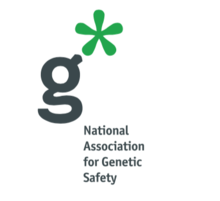National Association for Genetic Safety

National Association for genetic safety (NAGS) - is Russian non-profit organization. It was founded in 2004 in Moscow. NAGS declares its main aim to contribute the protection of biological and genetic safety of humankind and the environment. Elena Sharoykina is director of NAGS.
NAGS Activity
GMOs
Since its foundation NAGS has had a great influence on the development of public debate concerning the safety of modern biotechnology, including GMOs, in Russia.[1][2][3]
In 2008 NAGS in partnership with the Institute of Ecology and Evolution of A.N. Severtsov of Russian Academy of Sciences has conducted its own independent research on the impact of GMOs on the health of mammals. During the experiment hamsters, which were fed with GM soybean meal, were unable to reproduce a third generation of offspring.[4]
Factor GMO
In November 2014 during press-conference[5][6] in London NAGS announced the launch of ‘Factor GMO’ project. According to NAGS it would be world's largest International study on GMOs and pesticide safety. NAGS is an initiator of the project. It is supposed, that ‘Factor GMO’ will answer the question: Is this GM food and associated pesticide (Glyphosate / Roundup) safe for human health?
Official site[7] of the project is available in 7 languages: Russian, English, Spanish, French, German, Italian, Chinese.
Food safety
Since 2004 NAGS has implemented the project 'Public control of the grocery market'. NAGS conducts annual independent monitoring of food quality to defend interests of russian consumers. NAGS experts have found serious violations in foods from well-known russian and foreign manufacturers: dangerous bacteria and microorganisms, unauthorized food additives, genetically modified organisms (GMOs) without labeling in baby food etc.[8] Such violations could cause serious health problems. NAGS has repeatedly confirmed the validity of its independent reviews in court, responding to complaints from leading russian and international manufacturers.
In 2004 Nestle food corporation lost a legal battle against NAGS for claiming the company's children's food products sold in Russia contained heavy doses of genetically modified additives. According to NAGS report a series of Nestle children's food products contained significant amounts of genetically modified soya lecithin.[9]
References
- ↑ Moscow Bans GMO: Russia, the World’s Largest GMO-free Territory, Platform for the Development of Organic Agriculture. "Global research".
- ↑ "Russians eager to say NO to GMOs". Retrieved 2016-10-06.
- ↑ "Russian ecologists demand control over GMO foods import, push for moratorium". sputniknews.com. Retrieved 2016-10-06.
- ↑ Advocate, Jeffrey Smith Consumer; Author; Deception', 'Seeds of (2010-08-09). "Genetically Modified Soy Linked to Sterility, Infant Mortality in Hamsters | Huffington Post". The Huffington Post. Retrieved 2016-10-06.
- ↑ "GMO battles over 'settled' science spur new study of crops". Reuters. 2016-11-13. Retrieved 2016-10-06.
- ↑ Vidal, John (2014-11-11). "Largest international study into safety of GM food launched by Russian NGO". The Guardian. ISSN 0261-3077. Retrieved 2016-10-06.
- ↑ "Home | Factor GMO". Factor GMO. Retrieved 2016-10-06.
- ↑ "Результаты исследований ОАГБ - Общенациональная Ассоциация Генетической Безопасности". www.oagb.ru. Retrieved 2016-10-06.
- ↑ "Nestle loses food fight in Russia". Retrieved 2016-10-06.